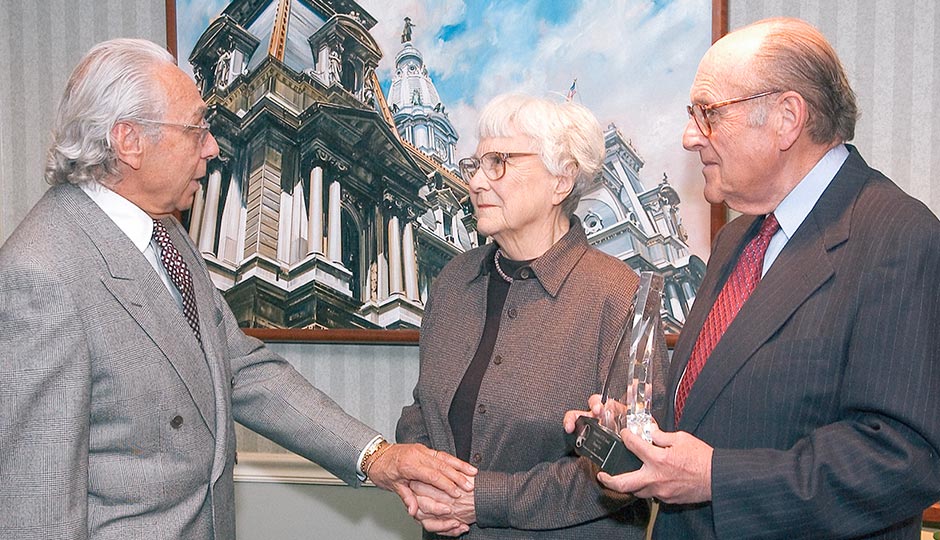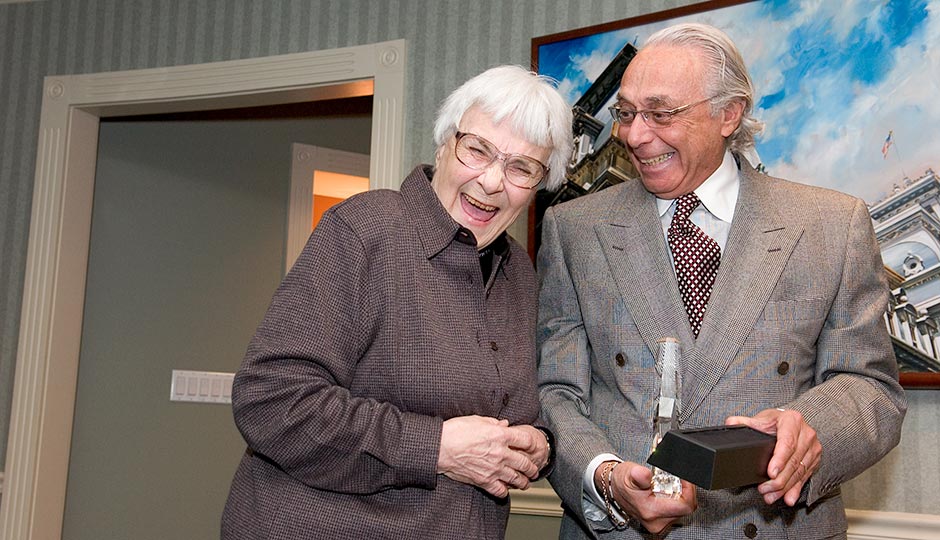What if You Got Harper Lee to Come to Philly — But Couldn’t Tell Anyone About It?

Harper Lee with Paul Rosen (left) and the late Steve Gadon. Photo | Paul Crane
Harper Lee was known as a recluse. The author of To Kill a Mockingbird — Pulitzer Prize-winning novel, classroom staple, the best courtroom drama of all time — was overwhelmed by the success of her first novel. She politely refused all interview requests.
But she made at least two visits to Philadelphia in her lifetime, and perhaps the most unlikely one was in 2005. It all started with Jennifer Reynolds, a Philly-area public relations pro.
That year, Reynolds was given a mission by her employer. The law firm of Spector Gadon & Rosen, P.C., had created an arts-focused foundation a few years earlier, and was looking for a way to get some attention for it. But not just that: Reynolds said the firm had tasked her to “come up with something different, that nobody’s ever done before.”
She thought about it. And then she came across a story about Atticus Finch as one of the most-admired characters in American literature. A few years earlier, he’d been named the greatest hero in American cinematic history. “I said, ‘He’s a lawyer, but he’s not reviled. Lawyers can be heroic!’” Reynolds recalls. “We should give an award for positive depictions of attorneys in the arts.”
And so the Spector Gadon & Rosen Foundation invented the ATTY Award, which would be given to positive depictions of attorneys in media. The first recipient of an award would have to be Harper Lee. Reynolds wrote her a letter.
“All my research online was that she was a recluse,” Reynolds remembers. “But I sent her a letter anyway, expecting that she would say, ‘Well, I don’t show up at some things.’ I said to her, there will be no ceremony, no dinner, no party, no hubbub, no speech … we simply plan to have the award delivered to you and make a donation.’”
Lee did her one better. She mailed a handwritten letter from Alabama, telling Reynolds she would be “very happy” to come to Philadelphia to accept the award. Lee famously turned down press requests for most of her life after being overwhelmed by the groundswell of praise for and attention given to To Kill a Mockingbird upon its release in 1960.
“I am in a state of shock, happy shock,” Lee wrote in her reply to Reynolds. “I … accept with deep gratitude but with the proviso that if you want to snatch it back for a more worthy recipient, I will understand but will be awfully upset.”

Harper Lee and Jennifer Reynolds. Photo | Paul Crane
Reynolds wasn’t sure what to expect when she went to pick up Lee and a friend after they took a train to 30th Street Station from New York. In the car ride, Reynolds made small talk. They got into a discussion about what she’d read about Lee on the Internet. Lee made Reynolds fess up that Lee was always described as very reclusive. “I must be the happiest recluse ever,” Lee replied, “because I go everywhere and do everything.” Lee’s friend butted in: “Well, I think you are a recluse.” They all laughed.
Reynolds said Lee told her that she had also visited Philadelphia once in the late 1950s. She went to Center City for business at Lippincott, which then had its headquarters on Washington Square. Lippincott would work with Lee on To Kill a Mockingbird and publish it to wide acclaim in 1960. (In 1978, the publisher was acquired by Harper & Row, which later became HarperCollins.)
When she arrived in Philadelphia, Lippincott representatives took her to two stops: The Liberty Bell, which was then in Independence Hall, and the bronze eagle at Wanamaker’s. “I guess they thought I was a little country girl who had never been to a department store,” Lee recalled to Reynolds during that 2005 visit.
Lee was no such woman: The Monroeville, Alabama, native moved to New York in the 1950s to pursue a writing career. The trip to the Wanamaker eagle was not intended to insult her, of course: Philadelphia boosters are really proud of the Wanamaker building — even today. Of course an attempt to show off the city made us look like the country bumpkins.
From 30th Street Station, Reynolds and her husband dropped Lee’s friend off at the Art Museum, then drove to Spector Gadon & Rosen at 17th and Market streets. (Yes, this time Philadelphians did not take Lee to a department store. They took her to a building with an off-track betting parlor in it.)
The ceremony at Spector Gadon & Rosen was short. Paul Rosen gave a speech about the ATTY Award, praised Lee and handed her a crystal sculpture designed by Peter Yenawine of Swarthmore. He also presented Lee with a $2,500 donation to an arts charity. Lee gave just a four-word acceptance speech: “Thank you very much.”
“Since Atticus Finch is an attorney, we felt that his selection as the greatest hero of cinematic history was a significant moment in American cultural history for our profession,” Rosen, president of the Foundation, said in a release at the time. “And we seized on it as the building block of a tradition. Harper Lee, author of the Pulitzer-Prize-winning novel which became the Academy-Award-winning film, was the perfect choice for the inaugural award.”
Afterward, Reynolds, attorneys from the foundation and Lee had lunch at the Pyramid Club. Lawyers from the foundation were at rapt attention. Reynolds says the most amazing part of the luncheon was that the guests didn’t look at their watches — truly an amazing feat for lawyers. “People were in awe,” Reynolds says. “I remember there was this moment, this awkward long, long lull before the conversation got going. Nobody knew what to say.”
Lee’s visit to Philadelphia didn’t make much news. In an attempt to get her to accept the award, Reynolds told Lee she wouldn’t be inviting any press to the event. It was a gambit to get her to accept; having heard she was generally reclusive, Reynolds figured she wouldn’t even test the waters — lest she scare Lee away. She said reporters from The Legal Intelligencer and The Philadelphia Inquirer asked to get in, but she had to demur. “Frankly, I thought that if we just put the fabulous photos and a news release on the wire it would be picked up,” Reynolds said. “It really wasn’t. I don’t know if people thought it was a hoax, or what.”
Lee, who had her draft novel Go Set a Watchman released last year, died in February. Oddly enough, the Atticus Finch in Watchman — whose near-universal admiration galvanized the creation of the award — is an aging racist who denounces desegregation and has attended a KKK meeting.
Reynolds said it was incredible she was able to meet the author because of an award she’d dreamed up. The ATTY Award has been given one other time, to Philadelphia actor Robert Prosky in 2008 for his portrayal of pro bono lawyer Hilton Barber in Dead Man Walking. “It’s really, really hard to find positive depictions of attorneys in the media,” Reynolds says.
Reynolds says she and Lee kept in touch after her visit to Philadelphia. Lee gave her the address to her place in New York with the following warning: “I want you to look at that, read it, memorize it, then chew up that piece of paper and swallow it.” Reynolds memorized that address, and the following year, she and her husband, Chris, took Lee to lunch in New York City for her 80th birthday, arriving to lunch about five minutes late. Lee was already sitting there at a booth. She had taken the bus over.
“She was a very lovely, sweet, genteel southern woman,” Reynolds remembers. “She was highly educated. She’s sort of shy — but she’s feisty. She definitely had this little fun sense of humor, a sort of mischievous personality.”

Harper Lee and Paul Rosen. Photo | Paul Crane
Follow @dhm on Twitter.


